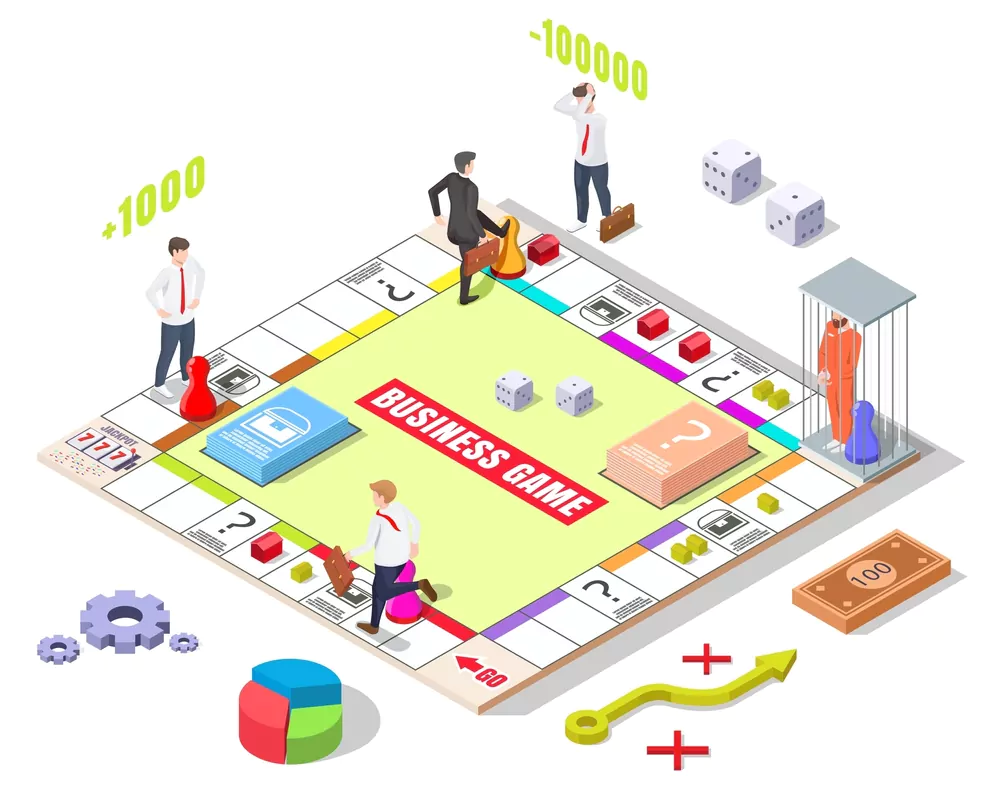How To Play Business Game? Strategies & Tactics

Are you keen to immerse yourself in the world of business, albeit on a smaller scale? The Business Board Game, often referred to as Monopoly in many parts of the world, is the perfect choice for you. This fun and interactive board game allows you to delve into the realms of buying, selling, and trading properties while learning invaluable lessons about managing money, making strategic decisions, and facing the consequences of these choices. But how to play business game? Allow us to guide you in mastering this classic board game.
1 The Objective of the Business Game
The main goal of the Business Board Game is straightforward – accumulate wealth and make your opponents bankrupt. The player who manages to survive the competition while amassing the most money and assets is declared the winner.
2 What's in the Box?

Before you begin playing, let’s familiarise ourselves with the components of the game:
The Game Board: The game board is square-shaped and divided into 40 spaces. These represent different properties (like streets, railways, and utilities), community chest, chance, free parking, go to jail, jail/just visiting, and the Go space.
Tokens: Each player selects a token that they move around the board. Traditional games include tokens like a top hat, a race car, a shoe, etc.
Money: The game comes with play money in different denominations, which players use to conduct transactions.
Property Cards: Each property has a corresponding title deed card, displaying the costs of rent, mortgage, and buildings and how these costs increase with the development.
Houses and Hotels: These are used to upgrade your properties, increasing their rent values.
Community Chest and Chance Cards: These cards could bring about unexpected fortune or misfortune, depending on the instructions.
3 Setting Up the Business Game
Firstly, each player selects a token and places it in the ‘Go‘ space. The game money is distributed among players. In the standard version, each player receives ₹1500, divided as follows: two ₹500s, four ₹100s, one ₹50, one ₹20, two ₹10, one ₹5, and five ₹1s. The remaining money goes to the Bank.
One player is selected as the Banker who manages the Bank’s money, property cards, houses, and hotels but can still play the game. Shuffle the Community Chest and Chance cards separately and place them face down on their allocated spaces on the board.
4 Gameplay
The game starts with players rolling two six-sided dice. The player with the highest total starts the game, and the play proceeds clockwise. On their turn, players roll the dice and move their tokens forward by the number of spaces indicated by the dice.
When a player lands on an unowned property, they can choose to buy it from the Bank by paying the amount listed on the property’s title deed card. The Banker gives them the card to signify ownership. If they choose not to buy, the Banker sells it at auction to the highest bidder.
Properties come in colour groups. Owning all properties of the same colour constitutes a monopoly and allows the owner to build houses and hotels on them, significantly increasing their rent value.
Landing on a property that is owned by another player necessitates paying rent to the owner, with the amount determined by whether the property is part of a monopoly and how many buildings are on it.
Landing on Chance or Community Chest spaces requires the player to draw a card from the respective deck and follow its instructions. These could lead to earning or losing money, moving to specific places on the board, or even going to Jail.
If a player lands on the ‘Go to Jail‘ space, draws a card that says ‘Go to Jail‘, or rolls doubles three times in a row, they must move their token directly to the Jail space and cannot collect ₹200 from passing ‘Go‘. On their next turn, they can pay a ₹50 fine to get out of Jail, use a ‘Get Out of Jail‘ Free card if they have one, or try to roll a double. If they fail to roll a double in the next three turns, they must pay the ₹50 fine.
The ‘Free Parking‘ space is a free rest space where no money is collected or paid, and no instructions are followed. However, some players add a rule where any taxes and fines collected are placed in the middle of the board and are taken by the player who lands on ‘Free Parking‘. This isn’t a rule in the official game, but it’s a popular house rule.
The game also includes income tax and luxury tax spaces. When landed, the player must pay the Bank the indicated amount.
5 Strategies
There are several strategies players can employ to win the game. For one, buying as many properties as you can early in the game increases the chance of building monopolies and earning more rent. Focusing on acquiring properties in the same colour group is also important for this reason.
Building houses and hotels on your monopolies can significantly increase the amount of rent other players have to pay you. Some players prefer to build three houses on each property in their monopolies as quickly as possible, as this is where the rent jumps are the greatest.
Trading properties with other players can also be a strategic move, allowing you to complete a monopoly or avoid paying high rents. However, you must be careful not to give away too much power in your trades.
6 Bankruptcy and Winning the Game
Players are eliminated from the game when they owe more money than they can pay to either another player or the Bank. Their assets are returned to the Bank if they owe the Bank or given to the creditor if they owe another player.
The game continues until only one player remains, who is declared the winner.
7 Wrapping Up
The Business Board Game is an exciting blend of luck, strategy, and negotiation. While the roll of the dice can change fortunes unexpectedly, smart and strategic decisions will consistently lead to better outcomes. It is a fun way to learn the principles of trading, negotiation, and money management, not to mention an excellent way to spend a leisurely afternoon or evening with friends or family.
Remember, each game is unique, and part of the fun is the unpredictability and the interactions between players. Keep an open mind, be ready to adapt to changing circumstances, and, above all, enjoy the game. Now that you understand how to play, it’s time to gather your loved ones and get down to business!
Community Q&A
About This Article
This article has been viewed 559 times.



